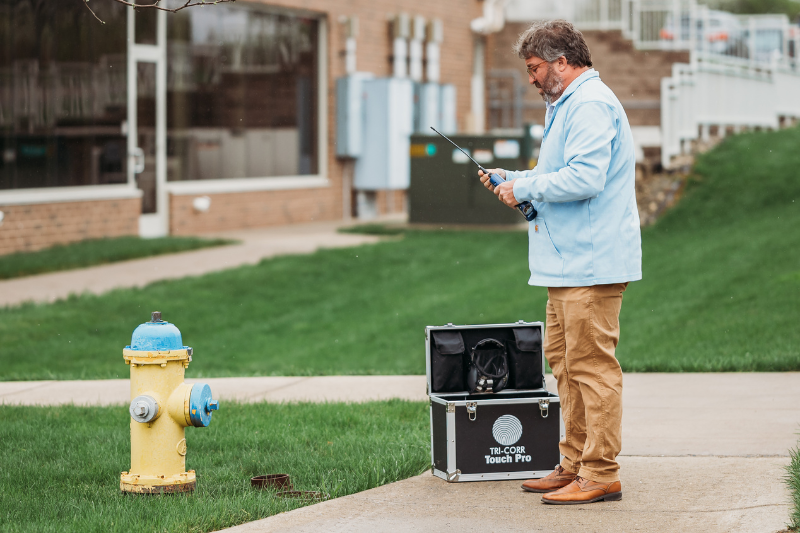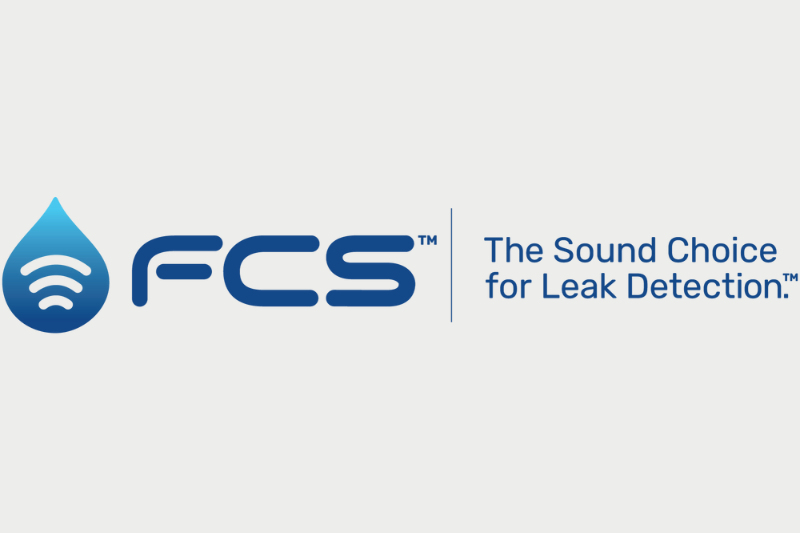By Holly Riddle

Fluid Conservation Systems (FCS) is a 40-year-old company that specializes in leak detection; it recently relocated to Happy Valley and is the latest player on the area’s sensor scene. FCS got its start when it invented and filed the first U.S. patent for the leak correlator that it still offers today; and now, FCS has about 500,000 sensors deployed globally, with about 300,000 of them listening for leaks within water networks.
According to Beth Powell, president, “The way our technology works is, we have a number of sensors that will give you the general location of where the leak is, underground, and then we have a product that will pinpoint exactly where the water companies need to dig.”

She added, “A water leak sounds like a note from a flute. Our sensors pick up that vibration and change it into an electric signal. If we have two sensors that can hear the same flute, we can correlate that to where the leak is located. With the sound delay from one sensor to the other, we can figure out the distance.
Powell, a Penn State alum, worked in oil and gas for New Pig Corporation in Altoona for about a decade before a headhunter with FCS’s parent company contacted her. She’s been with FCS for just over a year.
FCS has a few main competitors but is the only solutions provider in the space that works through cellular communication. Rather than service professionals needing to visit equipment and sites to get a reading, FCS’s clients can log into a computer remotely and see where leaks might exist within their water network.
“Originally, the product line included our ground mics and correlators,” Powell explained. From there, FCS’s solutions have advanced for easier and easier data collection. “Now, everything’s connected through the cellular network. [Utility crews] apply sensors that ‘listen’ every night and that have a five-year battery. Every morning when the utility logs in, they can see if any new leaks have popped up… New products are not only listening but, if they hear something, they record a sound file and those sound files correlate with where the leak is located, at the street level.”
Water leaks aren’t something that most of us think about when we fill a glass form the sink or brush our teeth, but they come with substantial costs.
Losing 6 billion gallons of water every day
“There are water districts in Pennsylvania that lose 80% of what they’re pumping out of wells and are taking out of the streams,” said Powell. “They’re treating all of that water with chlorine and then they’re losing 80% of it. If they lose that near a stream, the drinking water can kill fish. We’re trying to help them lose less water.”
Previously, if you were losing water, you could just pump more or take more from the river. We’re going to get to the point that that’s not an option. There are states and areas that are not going to be able to grow, because they don’t have enough drinking water.
According to Powell, across the U.S., districts lose approximately 6 billion gallons of treated water every day. That’s obviously a lot of water and it’s not being lost through gushing manholes; it’s being lost through pinhole leaks that have existed for years — the kind of leaks that FCS helps to detect.
How does all that water add up in dollars and cents?
Powell said, “A small utility [company] would treat about 5 million gallons [of water] per day and if they’re losing 24% of that, and between $4 and $5 per gallon in treatment chemicals, they’re losing somewhere between $1.8 million and $2.2 million’s worth of water every year… If it’s a really large utility treating a hundred million gallons per day, they’re losing more like $44 million.”
As Powell mentioned, that lost water negatively impacts the environment, too.
She added, “Drinking water is treated with chlorine, so if a leak is happening near a stream or a wetland, it’s killing the fish. The chlorine is having an environmental impact if it’s in a water body that it’s not supposed to be in… In Pennsylvania, a vast majority of our water comes from streams or wells. If [a utility is] losing up to 80% of its water, it’s over-pumping the streams and aquifers. In Pennsylvania, we have enough rain that they refill, but if we’re talking about the Southwest, if they’re over-pumping the aquifers, they’re going to get a sinkhole. Then, if the aquifer collapses, there’s no way to put that aquifer back in. If they’re over-pumping near the coastline, they’re also ruining the aquifers because they’re bringing in brackish salt water that’s mixing with the aquifer and contaminating it.”
In some other countries, water loss is regulated, but the United States doesn’t enforce water regulation beyond providing some guidance documents. That said, water loss is still a big issue for the United States, beyond even the environmental impacts. In some cases, water loss could prohibit population — and, as a result, economic — growth.
Powell noted, “In the past, the U.S. has never really had to worry about having enough water for everyone. If a town was growing, they would just put another well in, add some more piping and hook up a new development. We’re getting to the tipping point now in the U.S. There isn’t unlimited water anymore, so we have to be a little more systematic in what we’re doing. Previously, if you were losing water, you could just pump more or take more from the river. We’re going to get to the point that that’s not an option. There are states and areas that are not going to be able to grow, because they don’t have enough drinking water.”
Planning for the future

FCS previously operated out of Cincinnati, Ohio, but relocated to State College last year. The reasoning included having better access to the drinking water network in Pennsylvania, which is one of the oldest in the world, as well as Penn State’s many resources.
“It was hard for us to get technology personnel in Cincinnati. It was very, very hard for us to hire repair technicians and engineers,” said Powell. “We’re hopefully going to work on a project with Penn State’s Applied Research Lab and their Center for Acoustics and Vibration… We’re looking at them to help us remove false positives and to hopefully, at some point, be able to determine the size of a leak, so we can tell utilities where their largest leaks are.”
When relocating, FCS moved into a commercial space off Old Gatesburg Road where there’s plenty of expansion space to grow. Looking to the future, though, one of FCS’s priorities includes an opportunity outside of Happy Valley, though not too far away.
A small utility [company] would treat about 5 million gallons [of water] per day and if they’re losing 24% of that, and between $4 and $5 per gallon in treatment chemicals, they’re losing somewhere between $1.8 million and $2.2 million’s worth of water every year… If it’s a really large utility treating a hundred million gallons per day, they’re losing more like $44 million.
Made in America
While, previously, FCS’s sensors were made in the U.K., by the end of the year, they’ll be made in America, at a manufacturing plant in York, Pennsylvania. This will mean that, when utility companies and engineering firms that work with utility companies want to use FCS sensors in their pipe replacement projects, they’ll be able to submit that cost for payment through Build America, Buy America federal grants. This eliminates one of the major hurdles for potential clients, according to Powell, as smaller utilities may not be able to find the necessary funding for such solutions.
Additionally, FCS recently launched a new product, RadarSens, in the wastewater space, that will help monitor wastewater systems and prevent unnecessary treatment of excess groundwater that makes its way into the system after heavy rainfall. Likewise, FCS is now introducing a new service that helps customers interpret their data and discover where they need to send field crews.
“We’re finding that a lot of smaller municipalities don’t have a person who can monitor their network. They’re asking us every week to monitor it for them, listen to the sound files, categorize what the leaks are and prioritize where they’re sending the field crews. Municipalities have aging workforces and a lot of cutbacks, and departments are greatly understaffed. Next year, we’ll be providing this type of analysis to them as well,” said Powell.
To learn more about Fluid Conservation Systems, visit https://www.fluidconservation.com.






